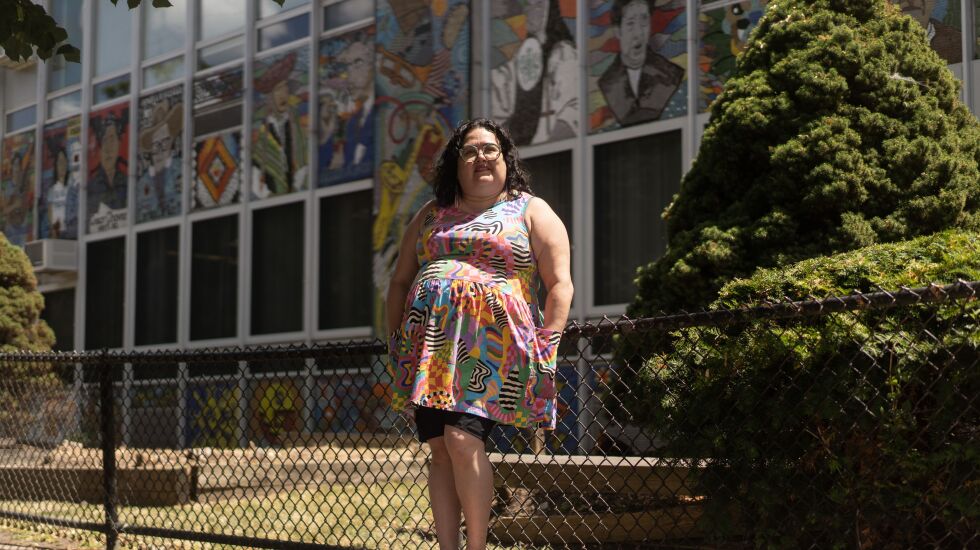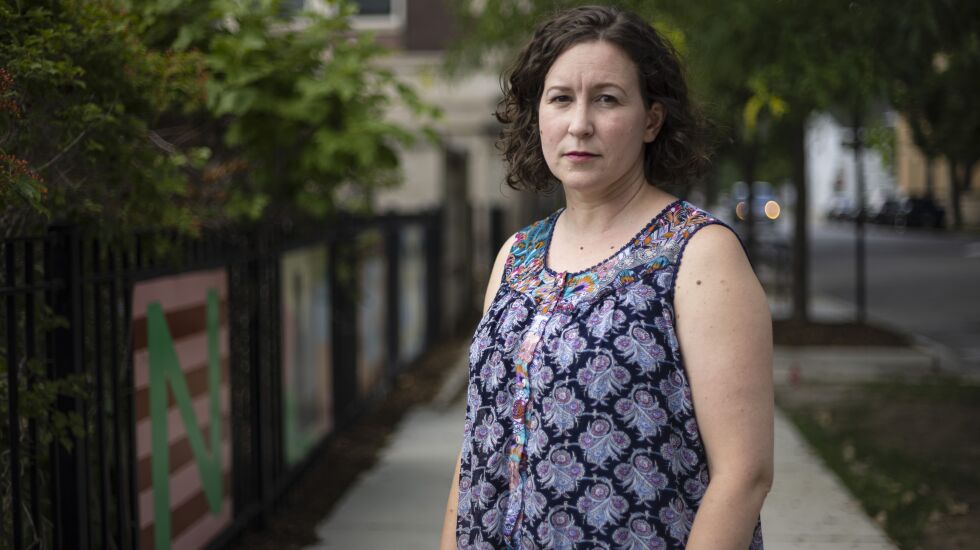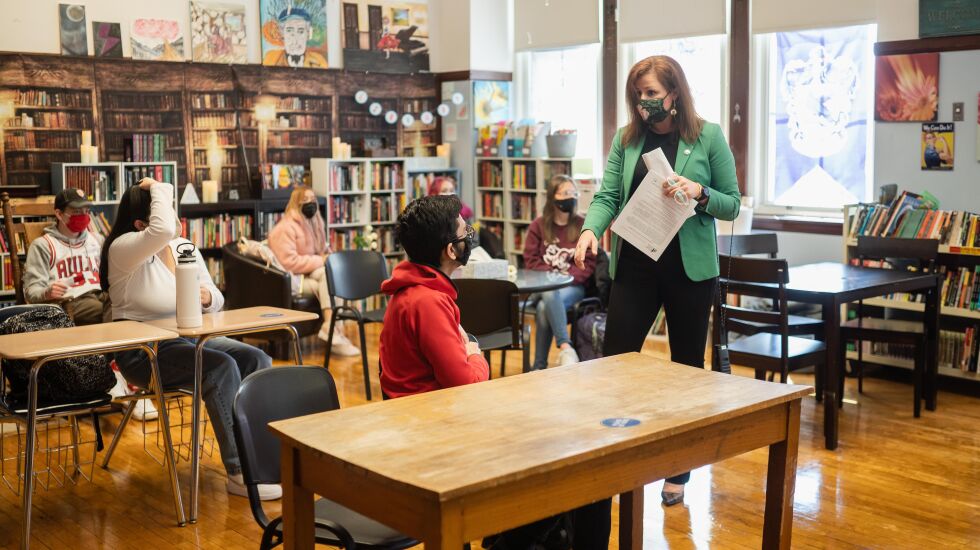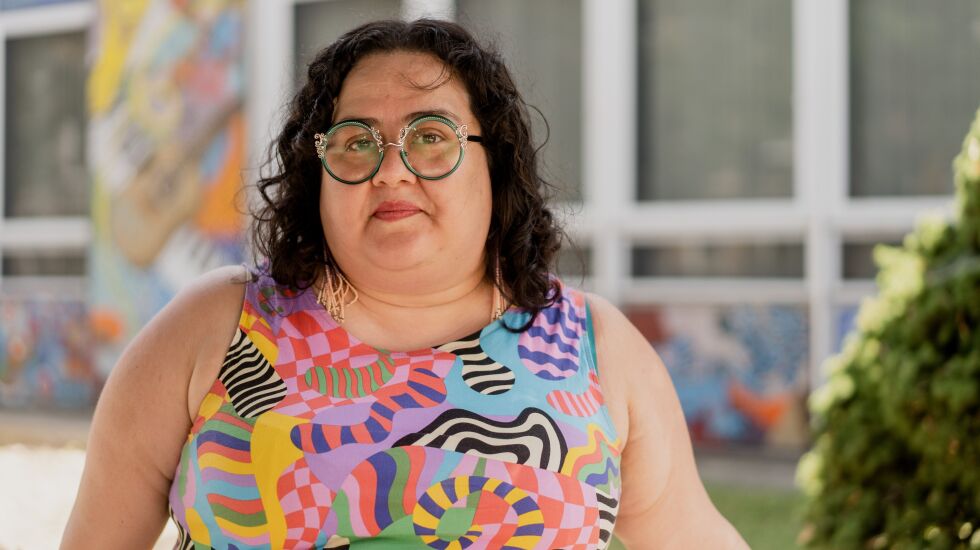
After eight years as the librarian at Reilly Elementary on the Northwest Side, Brenda Garcia moved to a school in Pilsen, where she grew up and still lives.
When she got to Cooper Dual Language Academy in her Southwest Side neighborhood, she saw clear signs of a school without a librarian for nearly a decade: Some kids didn’t know how to find books that appealed to them, many lacked key computer skills and most weren’t able to decipher online facts from fiction.
“A lot of times, schools don’t understand how much a librarian is bringing to the table because they’ve never had one,” Garcia said.
She and other librarians are worried that’s true of most Chicago Public Schools students at a time when literacy is vital to pandemic recovery, and public misinformation is seemingly at an all-time high.
The nation’s third-largest public school system with 290,000 students in 513 district-operated, non-charter schools, CPS is hovering around 90 schools with full-time librarians, staffing and budget records show. That leaves more than 400 without one — including about 82% of elementary schools.
And as the impact of budget cuts hit schools along racial lines over the past decade, a disparity developed: There are librarians at only 10% of schools where Black students are the largest percentage of the student body, compared with 25% of schools where white kids are, and 21% where Hispanic students are highest, according to analysis done by the Chicago Sun-Times and a Chicago Teachers Union researcher.
The fall of school libraries over the past decade has been precipitous. School library advocates recall a 2012 quote by the Rev. Jesse Jackson as he fought against closures of schools that had been starved of resources.
“There are 160 CPS schools without libraries; 140 of them are south of North Avenue. That’s apartheid,” Jackson said then.
Today, advocates say they’d be thrilled with those numbers.
Eight more schools laid off their librarians this summer. Among the departures were two of the district’s most well-liked and respected librarians. A few other schools are looking to hire a librarian for the fall, but not enough to make a dent in the district’s overall numbers.

Nora Wiltse, one of those who was laid off last month and perhaps the district’s most vocal library advocate, said the school library landscape when she started at CPS in 2003 was fruitful and well-resourced — “night and day” compared with today.
“Now we’re all on our own, and we’re all fighting to prove that we’re of value,” she said.
Advocates have said the decline started with the introduction of student-based budgeting — a school funding formula that a University of Illinois study found “concentrates low budget schools in Chicago’s Black neighborhoods.” Under the system — still in place today, though officials have tried to mitigate its effects — schools gain and lose funding according to the number of students enrolled, leaving principals to decide which positions to hire and lay off.
Over the years, majority Black schools on the South and West sides have been hardest hit by enrollment loss and subsequently lost funding, and librarians were among the first positions many principals cut.
Wiltse’s school for the past 14 years, Coonley Elementary in North Center, isn’t the typical place that comes to mind when the impact of school budget cuts is discussed. It’s on the North Side, has a very low poverty rate and is one of the district’s few majority white schools.
But the cuts that Wiltse has long fought against at other schools have now hit her own.
“If our schools can’t keep us,” she said, “I don’t even have any hope.”
Mary Beck, a former high school principal who now leads the district’s teaching and learning office, said librarians are a key part of any literacy strategy, and the district will continue consulting principals to evaluate funding priorities in future years. This year, principal input led to priorities on arts instruction and one-on-one educational specialists.
Beck added that some schools without libraries might have classroom book collections set up and that thousands of e-reading options are available to students on school-provided tablets.
“We’re not ignoring this by any means,” Beck said. “But we’re just trying to figure out what is the best path forward.”
On the racial disparities, Beck said officials will study whether literacy rates have fallen in schools without librarians.
“Anytime something’s that stark, it is something that would be of concern in the sense that it’s something we should further explore,” Beck said.

Chicago isn’t alone in cutting librarians.
Nationally, there has been a 20% decline in school librarian positions over the past decade, according to Seattle researchers exploring the shift. In 2018-19, the last full school year before the pandemic, at least one in five school districts nationwide had no librarians, affecting more than 7 million students.
Districts with the most students in poverty were almost twice as likely to lack librarians, as were those with the most English language learners, the researchers found.
“If school librarians are to have a long-term future in U.S. public education, the school library community needs to better understand the perceptions, values, and priorities of those who make staffing decisions,” the researchers wrote.
That appears to be a problem at some CPS schools, where Wiltse said she often feels even parents and fellow teachers have an outdated image of a gray-haired lady yelling about overdue books when they think of librarians.
Librarians are also typically equipped with master’s degrees, which puts them higher on CPS’ pay scale — and makes them more expensive for principals looking for ways to save money.
But research shows the benefits of modern school librarians are clear. They’re key to helping students read — regular reading and grade-level literacy proving vital to all aspects of a student’s educational and life success — and they also teach technology skills, information literacy, online safety and more. And CPS data shows circulation at schools without a librarian falls off a cliff, Wiltse said.

Garcia said her first students at Cooper weren’t all adept at beginner computer skills such as copying and pasting text, downloading images on a computer, creating slideshow presentations or basic use of a spreadsheet. She was also their first introduction to robotics and starter coding.
“We’re expensive, and I know that,” she said. “But I’m doing the work of three people, so it’s worth it.”
Leslie Westerberg, one of those recently laid off, said librarians also help students with research projects and finding accurate information online.
“Considering everything that’s happened in the last five years, like the way people use the internet not only for spreading misinformation but also for spreading hate and organizing violence, this is the time that we so desperately need librarians to instruct our students on how to evaluate information,” she said.
Westerberg spent the past nine years building a library from scratch at Nixon Elementary in the Hermosa neighborhood on the Northwest Side, a 95% Hispanic school with high poverty and limited English rates. Without a budget, she wrote grants to secure funding for books — growing the collection from 2,000 to 15,000 — plus furniture, iPads, laptops, a 3D printer and more. Her previous school, Burroughs Elementary on the Southwest Side, also laid her off and has since turned its library into a classroom, she said.
The Chicago Teachers Union demanded CPS hire a librarian for every school in its 2019 negotiations that included an 11-day strike. An agreement wasn’t reached on that issue.
As with many jobs, CPS has said it’s hard to find librarians to fill the positions even if the district was looking to hire.
Wiltse, who’s involved with state and national librarian groups, said fewer students are studying to become librarians, leading to a nationwide shortage. That means the few looking to get into the field are in high demand — so why, she pointed out, would they come to CPS where they won’t be guaranteed a budget, stability or job security, and may have to spend years building a library from nothing?
For now, officials are sending some classroom teachers who are already entrenched in their school communities to get a librarian certificate. The initial group includes 20 teachers, six of whom have completed their Illinois Library Media endorsement and been placed at schools for next year. Most are going to schools with a library that has been closed for at least five years.
“It’s really hard for us to get those librarians to take a chance on CPS when there’s other districts around that have proven they have a lot of loyalty and trust in their school librarians,” Wiltse said. “We have teachers who are very invested in their communities, they reflect the students they teach, and we want to take those teachers who already have a commitment and get them the certification rather than trying to pull people in.”







